Financial System Adaptability and Resilience
Financial systems differ across countries and tend to evolve slowly over time. Their structure is typically stable, but their resilience is often tested. A well-functioning financial system is vital for economic development, as it ensures that capital flows to the most productive and valuable investment opportunities. However, systemic vulnerabilities can have far-reaching consequences. For example, the 2007–08 global financial crisis emerged from within the financial sector itself when complex financial products fuelled a credit bubble in the U.S. housing market, threatening global economic stability when the bubble burst. That event led to extensive policy and regulatory reforms to strengthen financial system resilience.
Financial systems continue to face significant challenges. External shocks like the COVID-19 pandemic, the climate crisis, the green economic transition, and the energy crisis driven by geopolitical conflict all underscore the importance of financial systems that can absorb shocks and adapt to changing economic conditions. Motivated by these pressing issues, we investigate how financial systems respond to crises, which institutions and policies improve resilience, and the role of finance systems' setup in broader economic transformations. We use diverse data sources, including bank and firm-level data, regulatory reports, and house price and election data, to inform evidence-based policy.
Research Cluster
Financial Resilience and RegulationYour contact

- Department Financial Markets
EXTERNAL FUNDING
08.2022 ‐ 07.2025
OVERHANG: Debt overhang and green investments - the role of banks in climate-friendly management of emission-intensive fixed assets
The collaborative project “Debt Overhang and Green Investments” (OVERHANG) aims to investigate the role of banks in the climate-friendly management of emission-intensive fixed assets. This will identify policy-relevant insights on financial regulation, government-controlled lending and financial stability, as well as raise awareness among indebted stakeholders.
01.2015 ‐ 12.2019
Interactions between Bank-specific Risk and Macroeconomic Performance
07.2016 ‐ 12.2018
Relationship Lenders and Unorthodox Monetary Policy: Investment, Employment, and Resource Reallocation Effects
Leibniz Association
We combine a number of unique and proprietary data sources to measure the impact of relationship lenders and unconventional monetary policy during and after the European sovereign debt crisis on the real economy. Establishing systematic links between different research data centers (Forschungsdatenzentren, FDZ) and central banks with detailed micro-level information on both financial and real activity is the stand-alone proposition of our proposal. The main objective is to permit the identification of causal effects, or their absence, regarding which policies were conducive to mitigate financial shocks and stimulate real economic activities, such as employment, investment, or the closure of plants.
Refereed Publications
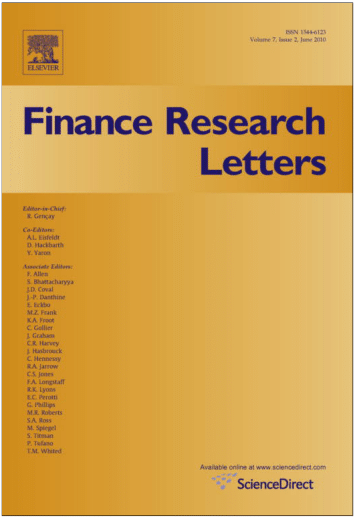
Commitment or Constraint? The Effect of Loan Covenants on Merger and Acquisition Activity
in: Finance Research Letters, June 2022
Abstract
We investigate how loan covenants associated with potential target firms affect takeover deals. We propose two possible channels. Under a discipline channel, the target firm becomes an attractive candidate for takeovers and merger deals are facilitated. Under a constraint channel, covenants hinder merger activity. We find support for the latter channel. Takeover likelihood is lower, deal failures are more common, the likelihood of price renegotiation is higher, and acquisition premium is lower when the target is bound by covenants. Covenant tightness exacerbates this effect.

Political Ties and Raising Capital in Global Markets: Evidence from Yankee Bonds
in: Journal of Corporate Finance, June 2022
Abstract
This paper examines whether state-to-state political ties help firms obtain better terms when raising funds in global capital markets. Focusing on the Yankee bonds market, we find that issuances by firms from countries with close political ties with the US feature lower yield spreads, higher issuance amounts, and longer maturities. Such an association is more pronounced for firms located in low income and highly indebted countries as well as firms in government-related industries, first-time issuers, and relatively smaller firms. Our study provides evidence supporting the notion that country-level political relationship is an important factor when raising capital in international markets.
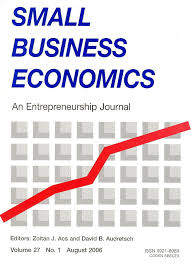
Bank Failures, Local Business Dynamics, and Government Policy
in: Small Business Economics, No. 4, 2022
Abstract
Using MSA-level data over 1994–2014, we study the effect of bank failures on local business dynamics, in the form of net business formation and net job creation. We find that at least one bank failure in the metropolitan statistical area (MSA) with the mean population prevents approximately 475 net businesses from forming in that area, compared with MSAs that experience no bank failures, ceteris paribus. The equivalent effect on net job creation is 16,433 net job losses. Our results are even stronger for small businesses, which are usually more dependent on bank-firm relationships. These effects point to significant welfare losses stemming from bank failures, highlighting an important role for government intervention. We show that the Troubled Asset Relief Program (TARP) is effective in reducing the negative effects of bank failures on local business dynamics. This positive effect of TARP is quite uniform across small and large firms.
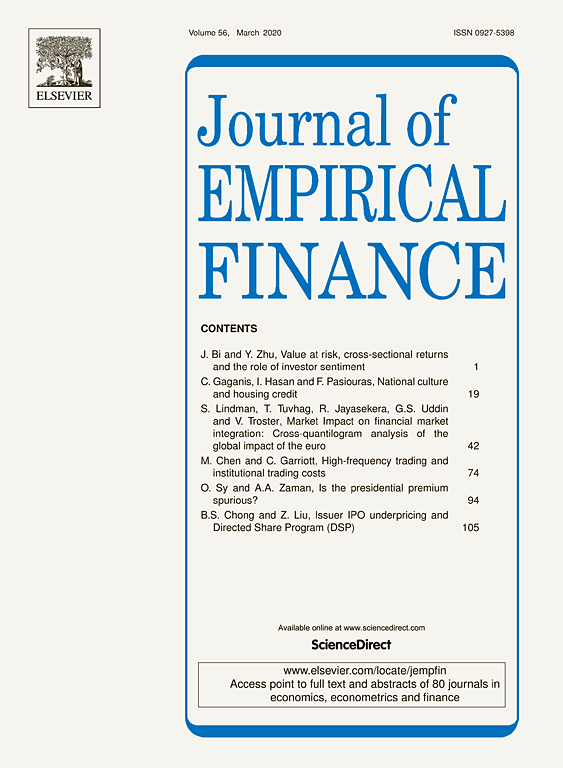
Income, Trading, and Performance: Evidence from Retail Investors
in: Journal of Empirical Finance, March 2022
Abstract
We examine whether household income influences the trading styles of retail investors and their investment performance. To investigate this question, we use a unique dataset of branch-level trading that contains all retail investors and observe that those investors with high income trade more and earn significantly higher returns in the stock market. In addition, this income effect becomes stronger for highly risky stocks, such as gambling or lottery-like stocks. These findings are in line with the information model theorized by Peress (2004) in which wealthy investors take extra risks by trading more stocks.

Banking Reform, Risk-Taking, and Accounting Quality: Evidence from Post-Soviet Transition States
in: Journal of International Accounting Research, No. 1, 2022
Abstract
The drastic banking reform within Central and Eastern Europe following the collapse of the Soviet Union provides an ideal quasi-experimental design to examine the causal effects of institutional development on accounting quality (AQ). We find that banking reform spurs significant improvement in predictive power of earnings and reductions in earnings smoothing, earnings-inflating discretionary provisions, and avoidance of reporting losses. These effects hold under alternative model specifications and after considering concurrent institutional developments. In contrast, corporate reform shows no such effects, refuting the alternative explanation that unobserved factors affect both reform speed in general and the quality of financial reporting. We further identify four specific reformative actions that are integral to the drastic banking reform process where prudential regulation contributes the most to the observed AQ improvement. It supports the conjecture that banking reform improves AQ by reducing banks' risk-taking behaviors and, as a result, their motive behind accounting manipulation.
Working Papers
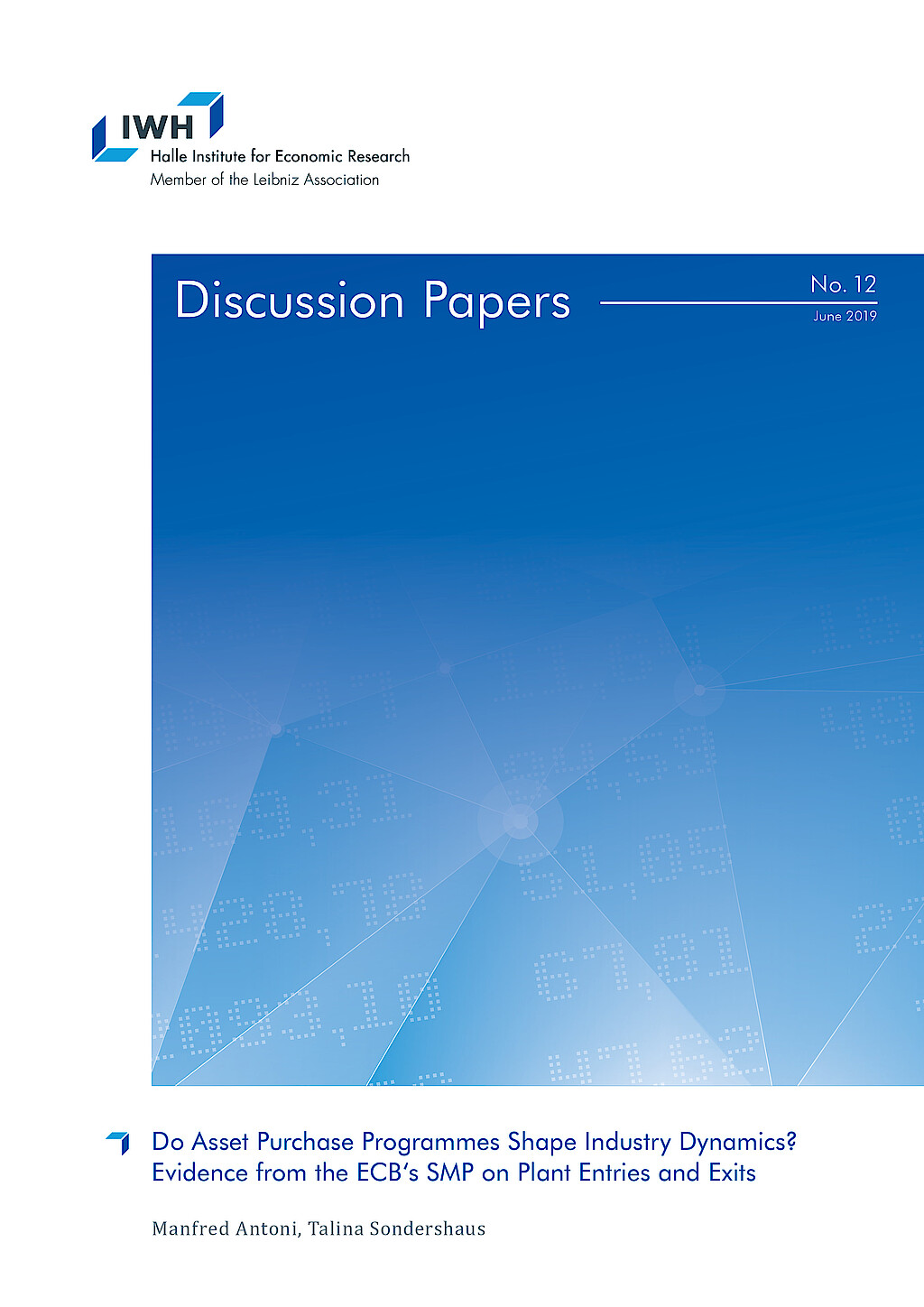
Do Asset Purchase Programmes Shape Industry Dynamics? Evidence from the ECB's SMP on Plant Entries and Exits
in: IWH Discussion Papers, No. 12, 2019
Abstract
Asset purchase programmes (APPs) may insulate banks from having to terminate relationships with unproductive customers. Using administrative plant and bank data, we test whether APPs impinge on industry dynamics in terms of plant entry and exit. Plants in Germany connected to banks with access to an APP are approximately 20% less likely to exit. In particular, unproductive plants connected to weak banks with APP access are less likely to close. Aggregate entry and exit rates in regional markets with high APP exposures are also lower. Thus, APPs seem to subdue Schumpeterian cleansing mechanisms, which may hamper factor reallocation and aggregate productivity growth.
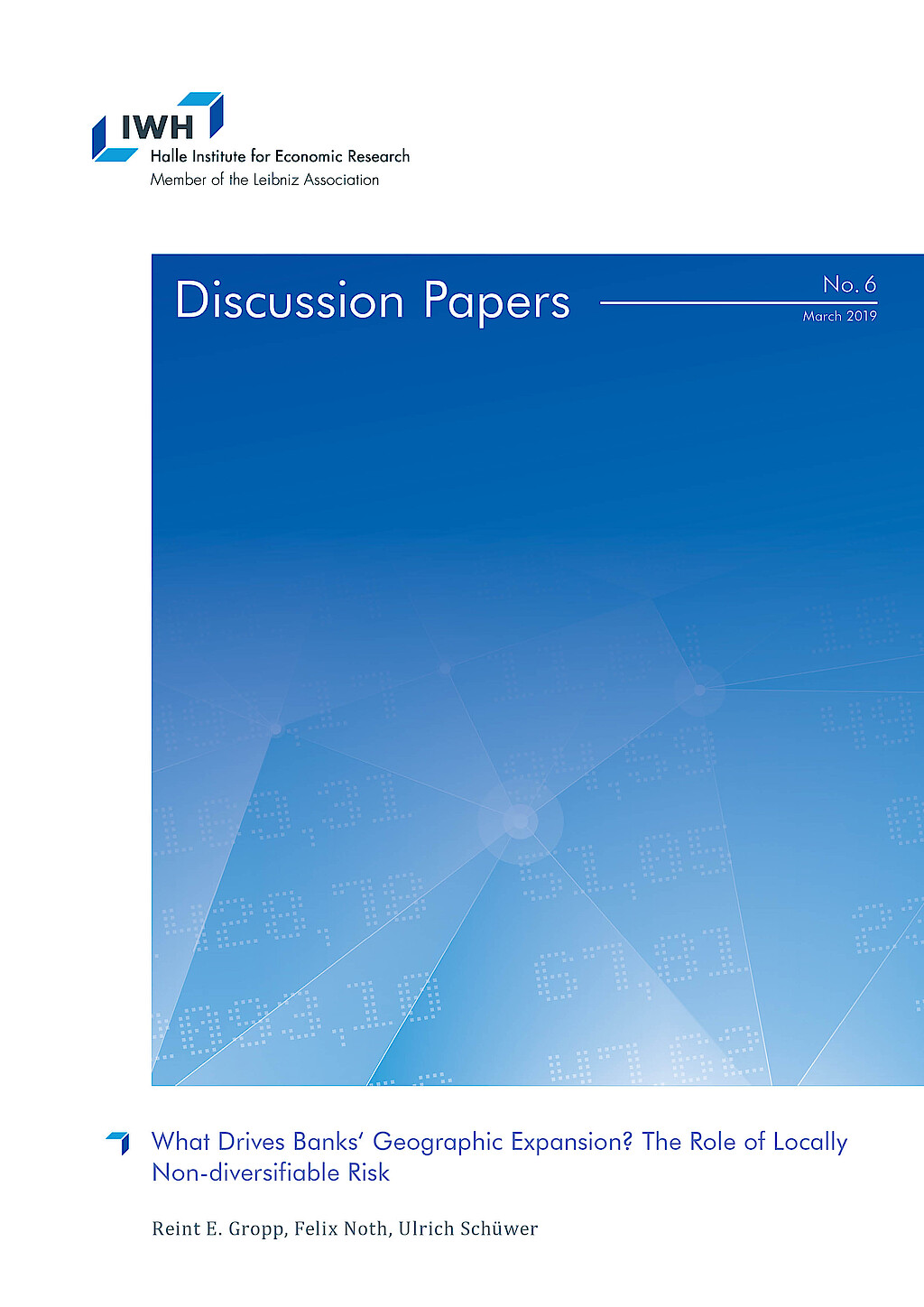
What Drives Banks‘ Geographic Expansion? The Role of Locally Non-diversifiable Risk
in: IWH Discussion Papers, No. 6, 2019
Abstract
We show that banks that are facing relatively high locally non-diversifiable risks in their home region expand more across states than banks that do not face such risks following branching deregulation in the 1990s and 2000s. These banks with high locally non-diversifiable risks also benefit relatively more from deregulation in terms of higher bank stability. Further, these banks expand more into counties where risks are relatively high and positively correlated with risks in their home region, suggesting that they do not only diversify but also build on their expertise in local risks when they expand into new regions.
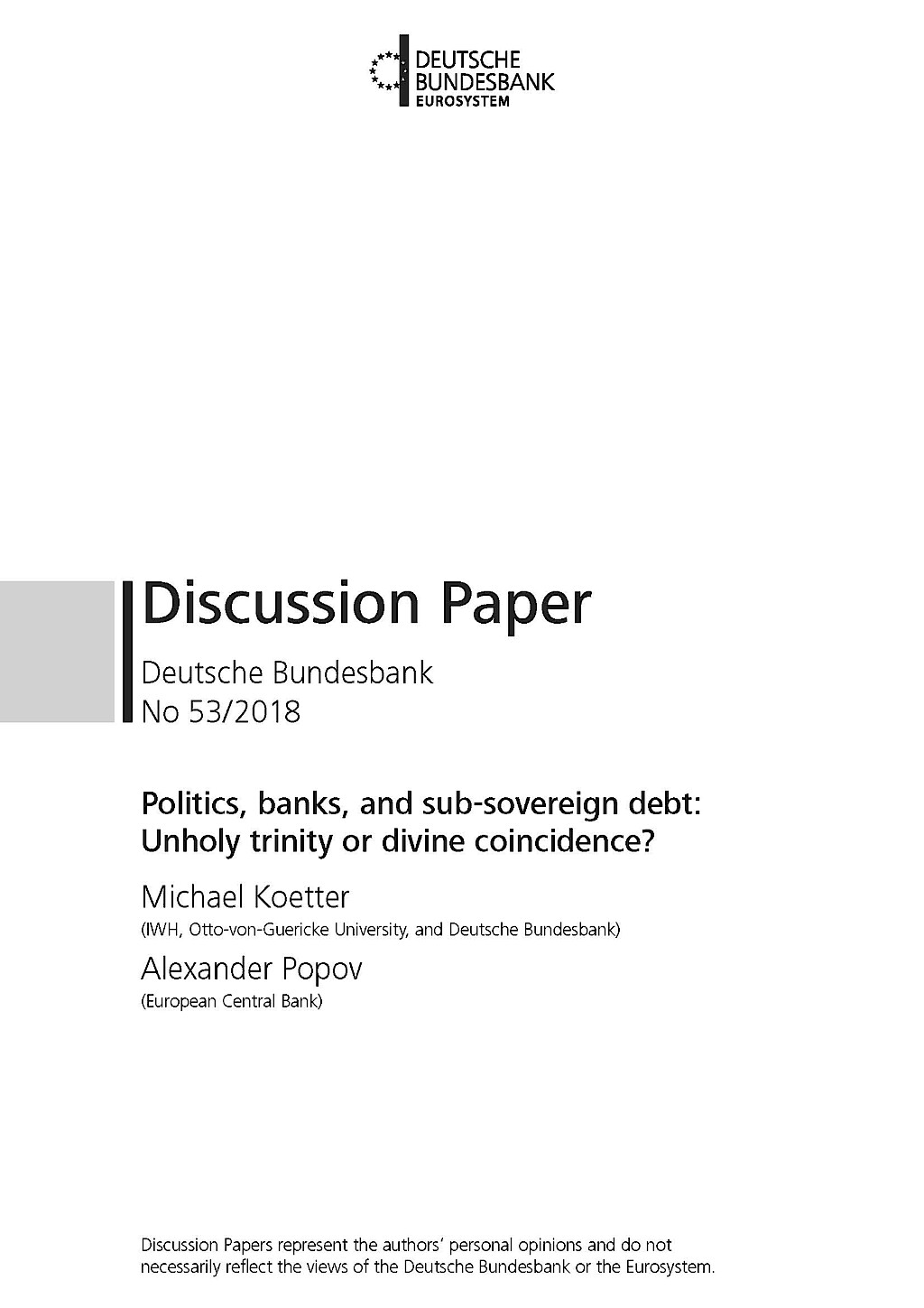
Politics, Banks, and Sub-sovereign Debt: Unholy Trinity or Divine Coincidence?
in: Deutsche Bundesbank Discussion Paper, No. 53, 2018
Abstract
We exploit election-driven turnover in State and local governments in Germany to study how banks adjust their securities portfolios in response to the loss of political connections. We find that local savings banks, which are owned by their host county and supervised by local politicians, increase significantly their holdings of home-State sovereign bonds when the local government and the State government are dominated by different political parties. Banks' holdings of other securities, like federal bonds, bonds issued by other States, or stocks, are not affected by election outcomes. We argue that banks use sub-sovereign bond purchases to gain access to politically distant government authorities.
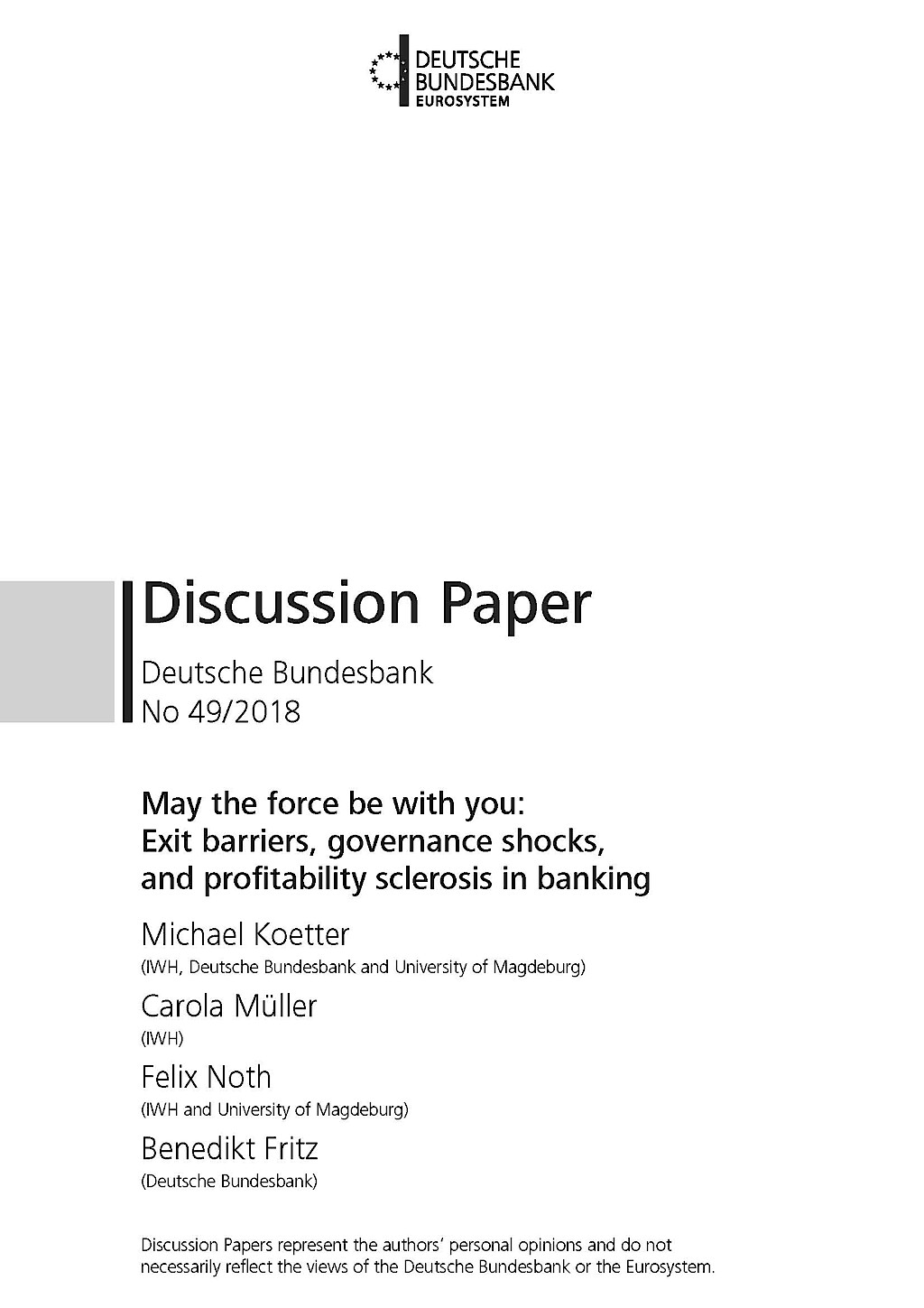
May the Force Be with You: Exit Barriers, Governance Shocks, and Profitability Sclerosis in Banking
in: Deutsche Bundesbank Discussion Paper, No. 49, 2018
Abstract
We test whether limited market discipline imposes exit barriers and poor profitability in banking. We exploit an exogenous shock to the governance of government-owned banks: the unification of counties. County mergers lead to enforced government-owned bank mergers. We compare forced to voluntary bank exits and show that the former cause better bank profitability and efficiency at the expense of riskier financial profiles. Regarding real effects, firms exposed to forced bank mergers borrow more at lower cost, increase investment, and exhibit higher employment. Thus, reduced exit frictions in banking seem to unleash the economic potential of both banks and firms.
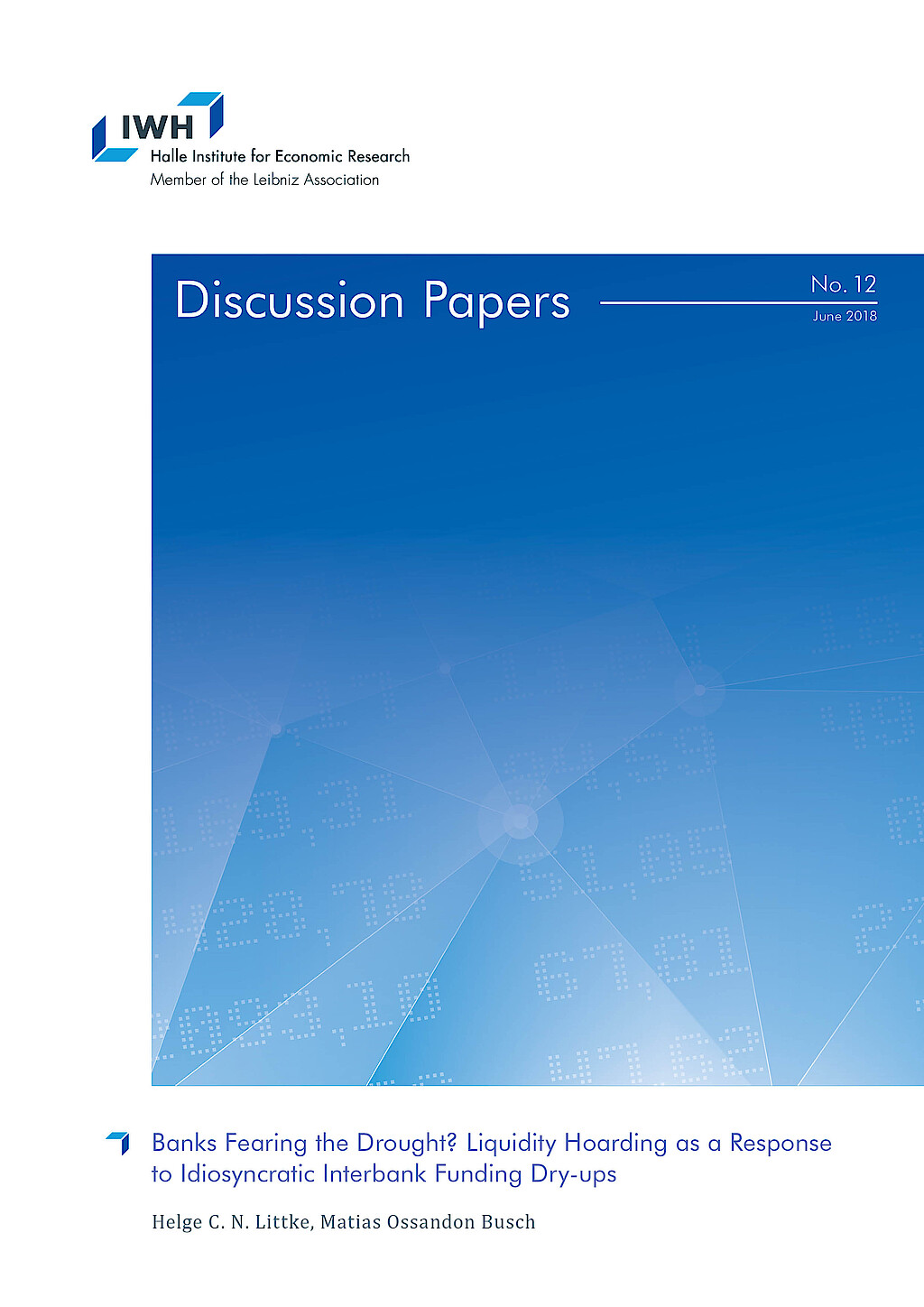
Banks Fearing the Drought? Liquidity Hoarding as a Response to Idiosyncratic Interbank Funding Dry-ups
in: IWH Discussion Papers, No. 12, 2018
Abstract
Since the global financial crisis, economic literature has highlighted banks’ inclination to bolster up their liquid asset positions once the aggregate interbank funding market experiences a dry-up. To this regard, we show that liquidity hoarding and its detrimental effects on credit can also be triggered by idiosyncratic, i.e. bankspecific, interbank funding shocks with implications for monetary policy. Combining a unique data set of the Brazilian banking sector with a novel identification strategy enables us to overcome previous limitations for studying this phenomenon as a bankspecific event. This strategy further helps us to analyse how disruptions in the bank headquarters’ interbank market can lead to liquidity and lending adjustments at the regional bank branch level. From the perspective of the policy maker, understanding this market-to-market spillover effect is important as local bank branch markets are characterised by market concentration and relationship lending.



















